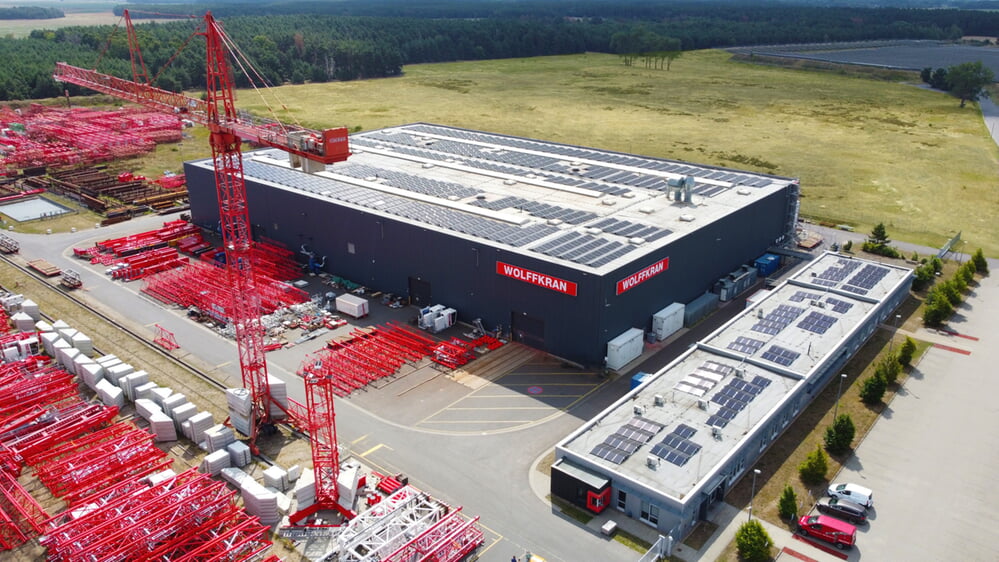- Careers
- Media & Events
- Downloads
-
- Europe
- Belgium
- Germany
- United Kingdom
- France
- Norway
- Austria
- Switzerland
- Czech Republic
- North America
- Canada
- USA
- Middle East & Africa
- United Arab Emirates
- Saudi Arabia

WOLFFKRAN has long recognized its responsibility to contribute to climate protection. As one of the first manufacturers in the industry to voluntarily compensate for its greenhouse gas emissions, we adhered to the "Clean Development Mechanism" defined in the Kyoto Protocol. Between 2021 and 2024, we offset the CO2 equivalent emissions of our two production sites in Heilbronn and Luckau, as well as our R&D Center in Ilsfeld, Germany. In 2024, we extended this initiative to our UK operations.
However, as an industrial company and manufacturer, WOLFFKRAN understands that true environmental responsibility cannot be achieved solely through the purchase of carbon credits. While our offsetting efforts have been a positive step, our focus is now shifting toward absolute emissions reduction and increased transparency on our sustainability performance. To achieve this, we have set measurable targets to reduce our environmental footprint, while ensuring that our products deliver superior performance and reliability on construction sites.
WOLFFKRAN Ltd.
Niall Conroy, Environmental Consultant
Sheffield, UK
+44 7816 390 292

In 2025, WOLFFKRAN releases its first Group-wide ESG report, outlining our roadmap to becoming a more responsible and sustainable business. This report details our efforts to integrate sustainability into our operations, ensuring compliance with regional legislation, and aligning with global commitments while continuing to generate value for stakeholders. Over the coming year, we will further develop our approach to monitoring, managing, and improving ESG performance. Recognizing our broader environmental and social obligations, we have decided to suspend the pre-purchase of carbon credits and, in turn, relinquish our ‘climate neutral’ status and claims. Instead, we are prioritizing emissions reductions through pollution prevention, energy efficiency, and resource optimization. While we will continue to use climate credits as part of our mitigation strategy, carbon offsetting will now be undertaken retroactively to accurately reflect our operational footprint.
Ongoing Environmental Stewardship
Additionally, WOLFFKRAN is committed to improving resource efficiency and circular economy initiatives, including reducing waste generation and increasing material reuse. By 2030, we aim to divert 90% of our waste from landfill. We are also exploring how we can extend product lifecycles and integrate more sustainable materials such as green steel into our manufacturing processes.

WOLFFKRAN recognizes its responsibility to protect the health, safety, and well-being of its employees, foster an inclusive culture, and engage with the communities in which we operate. Safety is a key priority, and we seek to exceed regional health and safety standards across our global operations where reasonably practicable. In the UK, our ISO 45001 Safety Management System ensures a structured approach to health and safety risk management.
We also remain dedicated to community engagement, supporting initiatives such as apprenticeships, internships, sports team sponsorships, and local charitable activities. In the UK, we have supported with organizations such as Breast Cancer UK, the Nasio Trust, and the Sheffield & Rotherham Wildlife Trust, reinforcing our dedication to social impact.

WOLFFKRAN upholds the highest ethical standards in business and governance, ensuring transparency and accountability. We adhere to the Swiss Ordinance on Due Diligence and Transparency, ensuring ethical sourcing and responsible supply chain practices, including assessing risks related to conflict minerals and child labour. Our Code of Conduct provides clear guidance for employees and suppliers, and we are enhancing auditing and reporting measures to strengthen compliance across our supply chain.
By embedding these commitments into our corporate governance framework, we aim to build trust, mitigate risks, and contribute positively to the communities and industries in which we operate. As WOLFFKRAN continues its ESG journey, we remain dedicated to making a tangible impact through meaningful actions, responsible business practices, and transparent communication.